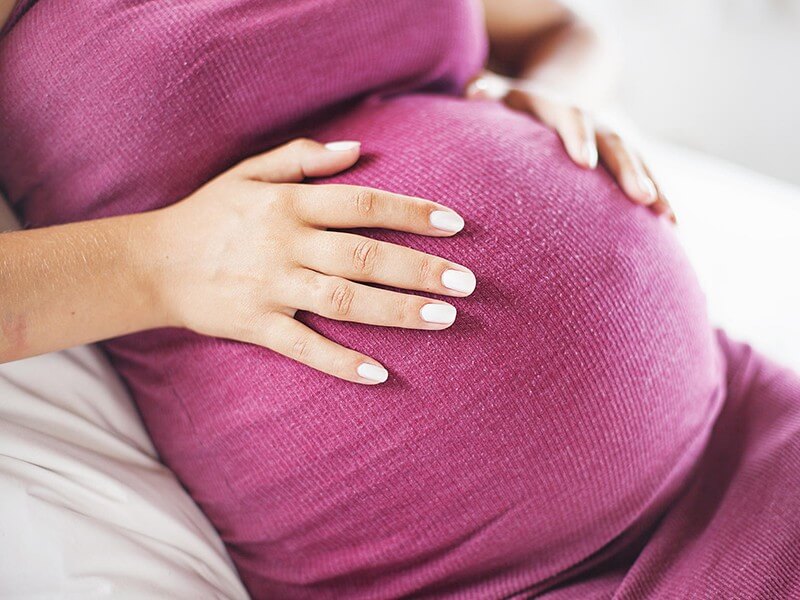Surrogate mother’s pregnancy

Fertilization
After a surrogate mother is examined and all the tests are done she is ready to participate in a program. It takes about 1 month to prepare for the embryo transfer. For the purpose of this procedure, the menstrual cycles of the genetic mother and the surrogate one must be synchronized (in case the IVF is to be done with the patient’s eggs). The GC’s endometrium is being prepared by estrogen and progesterone in two steps: in the first phase of her menstrual cycle she takes estrogens, and after that – progesterone. When the mother’s egg cells are removed from her ovaries and the father’s sperm is received, we can start the IVF procedure. The process of in vitro fertilization takes 3-5 days.
Pregnancy
As a matter of fact, surrogate pregnancy is just a regular pregnancy. Between the 12th and the 28th weeks of pregnancy a surrogate mother registers with the antenatal clinic. Starting from the first weeks the gestation course will be systematically monitored by doctors in order to define any possible pathologies of the fetus in advance and provide all the necessary medical aid. On average, during the nine months of her pregnancy, a surrogate mother visits the antenatal clinic about 14 times. Once a month before the 28th week, twice a month till the 37th week and each 7-10 days before the childbirth.
| Gestational age | Tests and analyses | Why are they done? |

7-8 weeks |
General examination of the surrogate mother by an obstetrician-gynaecologist | The gestational age (GA) and the supposed date of the labour are determined. A doctor evaluates the health state of the surrogate mother, examines her breasts and nipples and establishes an individual schedule of visits. The GC is given with recommendations on how to take medicines (folic acid, multivitamins, etc.). |
| Complete Blood Count | This is one of the principal methods to diagnose most diseases. | |
| Coagulogram | It’s the Blood Count for coagulability. If the index is too high, blood clots are more likely to form. If it’s below the norm, there are chances of bleeding. | |
| Urinanalysis | The way to estimate the state of kidneys | |
| Bacterioscopic analysis of the vaginal discharges | To help discover any inflammations and latent infections | |
| Measurement of blood pressure | General and uterine blood circulation are important indices during pregnancy. BP control helps to avoid any possible complications of the GC’s health and of the fetus’ development. | |
| Weighing | To control the weight changes starting from the 16th week of the surrogate mother’s pregnancy. During the 23rd and 24th weeks the weight increase is 200 grams per week, starting from the 29th week – not more than 300-350 grams. Before the labour the weight usually reduces by one kilogram because of the liquid loss in the tissues. Altogether, considering the mass of the fetus, the amniotic liquid and placenta, the pregnant woman’s weight increases by 10 kilos. |
|
| Pelvis size measuring | Pelvis size and shape are quite important for the labour process | |
| Visits to a GP, an endocrinologist and an oculist. An ECG is also required. | GP – 2 visits; oculist, dentist and endocrinologist – 1 visit. |
|
|
|
Examination by an obstetrician-gynaecologist (BP measurement and weighing) | |
| Urinanalysis | If the urine contains protein it’s the first sign of toxicosis. | |

12 weeks |
Examination by an obstetrician-gynaecologist (BP measurement and weighing) | |
| Urine analysis | This analysis reflects the state of kidneys and other organs and tissues. | |
| US | Is done at the 10th-14th week in order to specify the GA and to measure the thickness of the nuchal translucency (the norm is 2 mm; more than 3 mm is indicative of the Down’s disease). | |
| Prenatal screening (PAPP-A and hCG) | PAPP-A is used to define the risk of development various anomalies of child’s development at the early stages of surrogate’s pregnancy. | |
 16 weeks 16 weeks |
Examination by an obstetrician-gynaecologist (BP measurement and weighing) | |
| Determination of the fundal height of the uterus | Based on the result, the doctor might define the supposed mass of the fetus. | |
| Listening to the fetal heartbeat | Fetus’ palpitation can be heard with the help of a fetoscope starting from the 16-18th week of pregnancy. | |
| Urine analysis | ||
 18 weeks 18 weeks |
Examination by an obstetrician-gynaecologist (BP measurement, weighing, determination of the fundal height of the uterus and listening to the fetus’ heartbeat) | |
| Complete Blood Count | A way of diagnosing anemia – a possible complication during pregnancy which is characterized by the decrease of the hemoglobin level. | |
| Urine analysis | ||
| Blood Count for HAFP and hCG | Screening for chromosomal diseases and congenital malformations during the 16th-20th weeks of pregnancy. | |
 22 weeks 22 weeks |
Examination by an obstetrician-gynaecologist (BP measurement, weighing, determination of the fundal height of the uterus and listening to the fetus’ heartbeat) | |
| Urine analysis | ||
| Planned US | During 20th-24th week: in order to examine the fetus and estimate the well-being of the surrogate mother | |
| 3D US | Helps to evaluate the development of the fetus and to diagnose possible delays or placental insufficiency | |
 26th week 26th week |
Examination by an obstetrician-gynaecologist (BP measurement, weighing, determination of the fundal height of the uterus and listening to the fetus’ heartbeat) | |
| Urine analysis | ||
 30th week 30th week |
Examination by an obstetrician-gynaecologist (BP measurement, weighing, determination of the fundal height of the uterus and listening to the fetus’ heartbeat) | The surrogate mother gets a special certificate and a card with all the results of her examinations and tests. She has to always have this card on her, as the labour might start at any moment. |
| Clinical Blood Test | ||
| Urine analysis | ||
| Bacterioscopic analysis of vaginal discharges | ||
| Blood Count for RW | ||
| Blood Count for HIV | ||
| Estimation of the fetus’ position and detecting breech presentation | Breech presentation can be detected by an obstetrician-gynaecologist and then confirmed with an ultra-sound. Starting from the 32nd week of pregnancy, the surrogate mother is recommended to do a special complex of exercises to change the fetus’ position into a right one. | |
 33 weeks 33 weeks |
Examination by an obstetrician-gynaecologist (BP measurement, weighing, determination of the fundal height of the uterus and listening to the fetus’ heartbeat) | |
 35 weeks 35 weeks |
Examination by an obstetrician-gynaecologist (BP measurement, weighing, determination of the fundal height of the uterus and listening to the fetus’ heartbeat) | |
| Cardiotocography | With the help of cardiotocography the fetus’ cardiovascular system is examined. | |
| Urine analysis | ||
 37 weeks 37 weeks |
Examination by an obstetrician-gynaecologist (BP measurement, weighing, determination of the fundal height of the uterus and listening to the fetus’ heartbeat) | |
| Urine analysis | ||
 38 weeks 38 weeks |
Examination by an obstetrician-gynaecologist (BP measurement, weighing, determination of the fundal height of the uterus and listening to the fetus’ heartbeat) | |
| Urine analysis | ||
| Blood Count for RW | Done 2-3 weeks before the labour | |
 39-40th week 39-40th week |
Examination by an obstetrician-gynaecologist (BP measurement, weighing, determination of the fundal height of the uterus and listening to the fetus’ heartbeat) | |
| Urine analysis | ||
| US (if prescribed) | Done in order to define the fetus’ position and possible breech presentation, to evaluate the condition of the placenta and the baby for selecting the best approach to the delivery. |
Since the very beginning of a surrogacy program, our team will provide your surrogate mother with legal assistance, medical, financial and emotional support 24 hours a day, 7 days per week. We are taking on this amazing journey of creating a new life together!
Surrogate pregnancy is a long and complex process that must be carefully monitored. The “VittoriaVita” cares a lot about surrogate mothers and about the arrival of a new family member to the intended parents. Our team has a vast experience in supervising surrogate mothers’ pregnancies and can make sure that all medical examinations are done in time.
All data are shown as for an ideal pregnancy. In fact, all gestational cases are different. In the case a surrogate mother is not sure that the results of some medical analysis or test are right and true, she will have an additional examination or treatment. Our coordinators forward all the test results and doctor’s findings to the intended parents as soon as possible.
 10 weeks
10 weeks